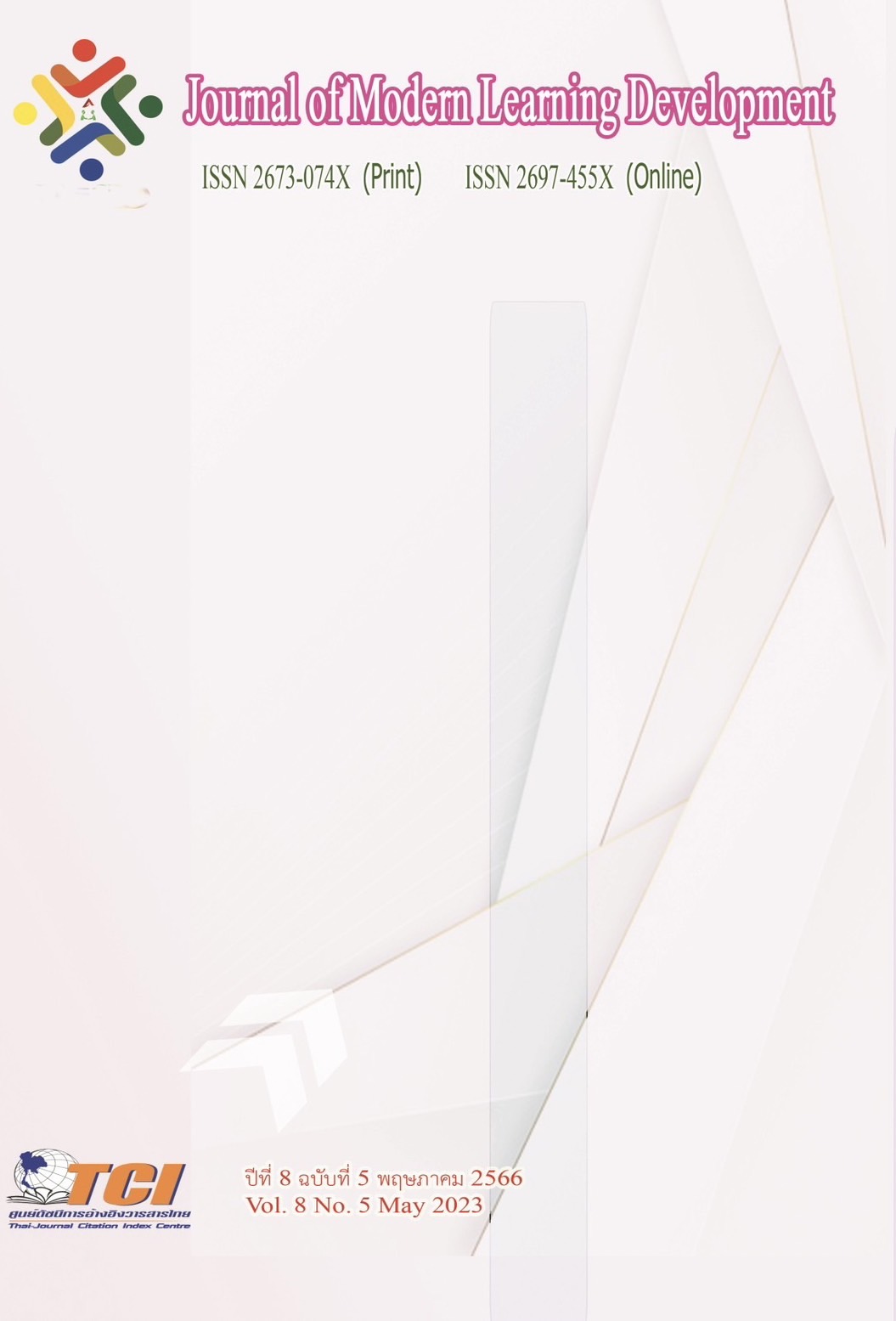The effect of high-scope experience-enhancing activities on basic mathematical skills of kindergarten 3
Main Article Content
Abstract
The objectives of this research were 1) to examine the effects of experiential activities based on the concept of high-scope on basic mathematical skills of kindergarten 3 and 2) to compare the effects of experiential activities based on the high-scope on the basic mathematical skills of kindergarten 3 students before and after the use of activity. The target group was 16 students in Kindergarten 3, Semester 2 of the academic year 2022 obtained by purposive sampling. This research tool is a high-scope experience plan, a mathematics skills assessmentb from, and 3 statistical plans The collected data was subjected to analyse using mean, standard deviation percentage and t-test.
The results of the research were as follows:
1. The effect of high-scope experiential activities on the basic mathematical skills of Kindergarten 3 students prior to the use of experiential activities based on the high-scope concept. Early childhood children have low mathematical skills (= 0.73, S.D. = 0.71). After high-scope experiential activities were used, and early childhood children had a high level of mathematical skills (= 3.77, S.D. = 0.86)
2. A comparison of the use of high-scope experiential activities on basic math skills of Kindergarten 3 students showed statistically significant post-activity mathematical skills at .05.
Article Details
References
กระทรวงศึกษาธิการ. (2560). หลักสูตรการศึกษาปฐมวัย พุทธศักราช 2560. กรุงเทพมหานคร: คุรุสภา.
ณัฐญา นันทราช. (2563). การพัฒนาทักษะการคิดพื้นฐานของเด็กปฐมวัย โดยการจัดประสบการณ์การเรียนรู้แบบไฮสโคปด้วยกิจกรรมเกมการศึกษา. วิทยานิพนธ์ปริญญาครุศาสตรมหาบัณฑิต สาขาวิชาหลักสูตรและการสอน. บัณฑิตวิทยาลัย: มหาวิทยาลัยราชภัฏสกลนคร.
ณัฎฐา มหาสุคนธ์. (2561). การจัดประสบการณ์ตามแนวคิดไฮสโคปเพื่อพัฒนาทักษะพื้นฐานทางคณิตศาสตร์ของนักเรียนอนุบาลชั้นปีที่ 1. วิทยานิพนธ์ปริญญาศึกษาศาสตรมหาบัณฑิต สาขาวิชาการวิจัยและ พัฒนาหลักสูตร : มหาวิทยาลัยเทคโนโลยีราชมงคลธัญบุรี.
นิวัฒน์ สาระขันธ์. (2564). สอนอย่างไรให้นักเรียนเกิดทักษะและกระบวนการทางคณิตศาสตร์, Journal of Roi Kaensarn Academi. 6 (4), 202-218.
ยูนิเซฟ. (2564. ม.ป.ป). พันธกิจประเทศไทย ฟื้นฟูการศึกษา ปีการศึกษา 2564. ออนไลน์. สืบค้นเมื่อ 5 มกราคม 2565.แหล่งที่มา: https://www.unicef.org/thailand/media/8146/file/Mission% 20Recovering%20Education%20in%202021%20TH.pdf
รุสนี เจะเตะ และคณะ. (2562). ผลการจัดกิจกรรมตามแนวคิดไฮสโคปร่วมกับเกมการศึกษาที่มีต่อความสามารถในการคิดวิเคราะห์ของเด็กปฐมวัยชั้นอนุบาลปีที่ 2. การประชุมหาดใหญ่วิชาการระดับชาติและนานาชาติครั้งที่ 11. มหาวิทยาลัยหาดใหญ่ : น. 1431.
ลันดา ตรีตุนา. (2560). การพัฒนาการจัดประสบการณ์การเรียนรู้ตามแนวคิดไฮสโคปที่ส่งเสริมความสามารถทางคณิตศาสตร์สำหรับเด็กปฐมวัย. การศึกษาค้นคว้าด้วยตนเอง ปริญญาการศึกษามหาบัณฑิต สาขาวิชาหลักสูตรและการสอน. บัณฑิตวิทยาลัย: มหาวิทยาลัยนเรศวร.
วีระชาติ กิเลนทอง. (2563). โครงการสำรวจและประเมินความพร้อมเด็กปฐมวัยเข้าสู่ระบบการศึกษา(SchoolReadiness). ออนไลน์. 10 ตุลาคม 2566. แหล่งที่มา: https://research.eef. or.th/ research/school-readiness/
สถาบันส่งเสริมการสอนวิทยาศาสตร์และเทคโนโลยี กระทรวงศึกษาธิการ. (2563) กรอบการเรียนรู้และแนวทางการจัดประสบการณ์การเรียนรู้บูรณาการวิทยาศาสตร์ เทคโนโลยี และคณิตศาสตร์ในระดับปฐมวัยตามหลักสูตรการศึกษาปฐมวัย พุทธศักราช 2560. กรุงเทพมหานคร: บริษัท โกโกพริ้นท์ (ไทยแลนด์) จำกัด.
สำนักงานเลขาธิการสภาการศึกษา. (2550). การเรียนรู้ของเด็กปฐมวัย: ตามแนวคิดไฮสโคป. กรุงเทพมหานนคร: หจก. วี.ที.ซี คอมมิวนิเคชั่น
Hohmann, M. and Weikart, D.P. (1995). Educating Young Children. United States of America:High/Scope Press.
Likert, Rensis. (1967). The Method of Constructing and Attitude Scale. Attitude Theory and
Measurement. Fishbeic, Martin, Ed. New York: Wiley & Son.


